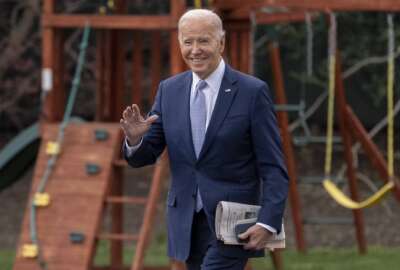Roundup of what just happened in Congress for 2024
In voting last week, Congress managed to fund the half of government it had not already.
In voting last week, Congress managed to fund the half of government it had not already. For some highlights of the bill and other congressional matters, the Federal Drive with Tom Temin spoke with WTOP Capitol Hill Correspondent Mitchell Miller.
Interview Transcript:
Tom Temin So, they did get the government funded six months almost into the fiscal year.
Mitchell Miller Yes. Not without a lot of drama, which is usually the case around here. But among the many things that are included in this legislation is a new requirement related to telework. It’s going to require the Office of Management and Budget to submit all agencies their return to office action plans within 90 days after this is actually signed into law. Agencies are going to have to provide more information on their telework policies. The average number of employees working in the office during a two-week period. And as you well know, it’s been nearly a year since OMB called on federal agencies to return staff to the office at least 50% of the time. The action also looks for workforce factors, including productivity and employee engagement. Ways to measure these type of things. So, this has been part of this effort of lawmakers to push to try to get these federal agencies and federal workers back into their offices.
Tom Temin Yeah, in some ways, then the Republicans, which are in favor of more return to the office, are oddly aligned with the white House on that particular matter.
Mitchell Miller Yeah, that’s right, because the white House has also been pushing these agencies to do more. So there really is kind of a coalition here. You know, the some of the federal unions, as you know, have been pushing back on some of the things that have been done. Others have been a little more amenable. But clearly, this push, again, related to telework is going to keep happening.
Tom Temin And the IRS funding that it originally was promised for the ten years seems to be shrinking.
Mitchell Miller Right. So, there was a huge amount of billions of dollars going to the FBI. And now Congress is giving it a bit of a haircut, in fact, quite a significant haircut of about $20 billion. This is money that was going to go to an over the years modernization series of funds to the IRS to try to get them to upgrade all of their computer equipment and a variety of record keeping. And, the agency still has about $60 billion under this modernization plan, but this was considered a victory for Republicans to cut back on some of that and then a much smaller amount of money, but certainly significant to our area. There is more money going to the FBI headquarters, which is going to be built in Greenbelt, Maryland. The Maryland delegation securing $200 million to go toward, projects related to that. That’s on top of 375 million that was appropriated the previous year. Lawmakers say that there’s about $1.5 billion in the pipeline now for these for this new headquarters. So still a long way away from, that first spade going into the dirt. But also, Virginia lawmakers are trying to reverse this decision. They were, of course, competing for another site in Northern Virginia. They are really touting a GSA inspector general’s investigation that is ongoing. However, I think it’s pretty unlikely at this point, given all the talk about this and new headquarters, whether this is actually going to be reversed.
Tom Temin Yeah, $200 million this year. That’ll just about cover the environmental impact studies, maybe then putting up a little fence around the property. I wanted to also ask you about the pay raises. Those seem to have gotten solidified for federal employees and service members in there.
Mitchell Miller Right. So, this is, of course, a big one. And it’s related in part to the inflation. There’s a 5.2% pay increase for military personnel, also the same amount, for federal government employees. So pretty significant bump there in this major omnibus bill. However, as we look ahead to 2025, the white House has proposed a pay raise of only about 2%. And as you know, that has caused some complaints from many of the federal employees’ unions. But for now, there will be this more than 5% pay hike coming.
Tom Temin We’re speaking with Mitchell Miller, Capitol Hill correspondent for WTOP. And of course, now Congress is going to be leaving for a couple of weeks of recess. But there is the 2025 budget proposal. Anyway, that came out a couple of weeks ago from the white House. Any action on that? What are they going to do next there?
Mitchell Miller Right. Well, they have started to kick off some hearings related to that. And there is a lot of discussion about, the proposals. Of course, it’s 7 trillion plus dollars, from the white House. That starting point to get the discussion going. And then this past week, Republicans also released their own proposal for fiscal 2025. And the one that thing that’s really getting a lot of attention, not surprisingly, during this political year is a GOP proposal to raise the age for Social Security. They are recommending that it be bumped up from the current 67. But being a political year, they didn’t say what that would actually be. But as you might imagine, a lot of, congressional Democrats are jumping on that, saying that that Republicans want to cut back or to make it longer for you to actually get your Social Security. So, I think that will be a big talking point moving ahead. But some of these hearings now are moving forward. Finally, as we have completed work on 2024’s fiscal year, close to six months after it was supposed to be approved.
Tom Temin Yeah. And that idea of some sort of form of Social Security reform probably comes on the fact that the CBO itself reported that for the next ten years, there’s going to be trillion plus dollar deficits. And it’s not driven by what Congress appropriates to operate the government, but by CMS, Medicare, Medicaid, Social Security spending and interest on the debt, which is growing.
Mitchell Miller Right. And there’s been a handful of lawmakers from both parties who have been warning about this for years, but it always seems to be taken over by what some people call the politics of today, that whatever is happening now, they just want to push it down the line. And that is going to come at some point. And a lot of the people that have also been warning about the federal budget deficit have been pointing to this as well. However, there just doesn’t seem to be the political courage to move forward with anything specific on this.
Tom Temin And what can we expect on Ukraine aid, Israel aid? This is all kind of in limbo at this point, right?
Mitchell Miller House speaker Mike Johnson has been very coy on this. He’s basically been trying to put everything on the shelf until everything was finally completed with the federal budget process, which was obviously an ordeal as we just discussed. One possibility is that Ukraine aid and Israel aid might come up in separate proposals in the House and then specifically related to Ukraine. One of the measures that’s getting a lot of attention right now, or at least being floated as a trial balloon, is providing it as partly a loan to Ukraine. This is got a lot of support from Republicans. Democrats are still kind of feeling it out. Former President Trump has indicated that he likes that. And of course, a lot of House Republicans go along with what he wants. So, they are kind of discussing whether or not that might happen. Keep in mind that the bulk of aid for Ukraine would actually be going back to replenish military equipment here in the U.S., and that would only be a fraction that would actually go specifically to Ukraine without any strings attached. But there are lawmakers who now want to attach those strings, and then we’ll have to see separately what happens for Israel, because there’s a big push there as well.
Tom Temin Yeah, well, it was Franklin Roosevelt that started Lend-Lease. So, there’s some precedent for this in the in the recesses of history. And just a final question about the state of security on Capitol Hill itself, lawmakers starting to get concerned about their own personal safety.
Mitchell Miller Right. There was a hearing last week that was very interesting. There’s been a lot of talk from House Republicans about crime citywide in D.C., but this really focused in on what’s been happening around this Capitol complex and in the blocks that extend nearby. And there’s been a lot of high-profile situations where a lawmaker was carjacked just a few blocks from here. There have been staffers who have been held up at gunpoint. Another lawmaker was assaulted. And so there has been real concern about what is happening along the blocks around the U.S. Capitol. And some are saying are, you know, tourists or people that come to D.C., are they going to be safe? And during this hearing, it was acknowledged by the U.S. Capitol Police Chief Tom Manger, that that stepped up criminal activity has actually caused his officers to have to push out several blocks away from the Capitol to help Metropolitan Police here in DC to deal with these issues. And while crime overall in D.C. has gone down, there are areas around Capitol Hill including robberies and stolen cars are continuing to uptick. So, a lot of concern about that around here. Now, on the other side, Chief Manger did point out that in the Capitol complex itself, the crime rate is very, very low and it is obviously very, very well protected. But keep in mind, there are thousands of staff members that come in back and forth, not to mention all of the visitors that come to the Capitol in this whole area every day. So, it is a concern that’s got the attention of lawmakers, for sure.
Copyright © 2024 Federal News Network. All rights reserved. This website is not intended for users located within the European Economic Area.
Tom Temin is host of the Federal Drive and has been providing insight on federal technology and management issues for more than 30 years.
Follow @tteminWFED






